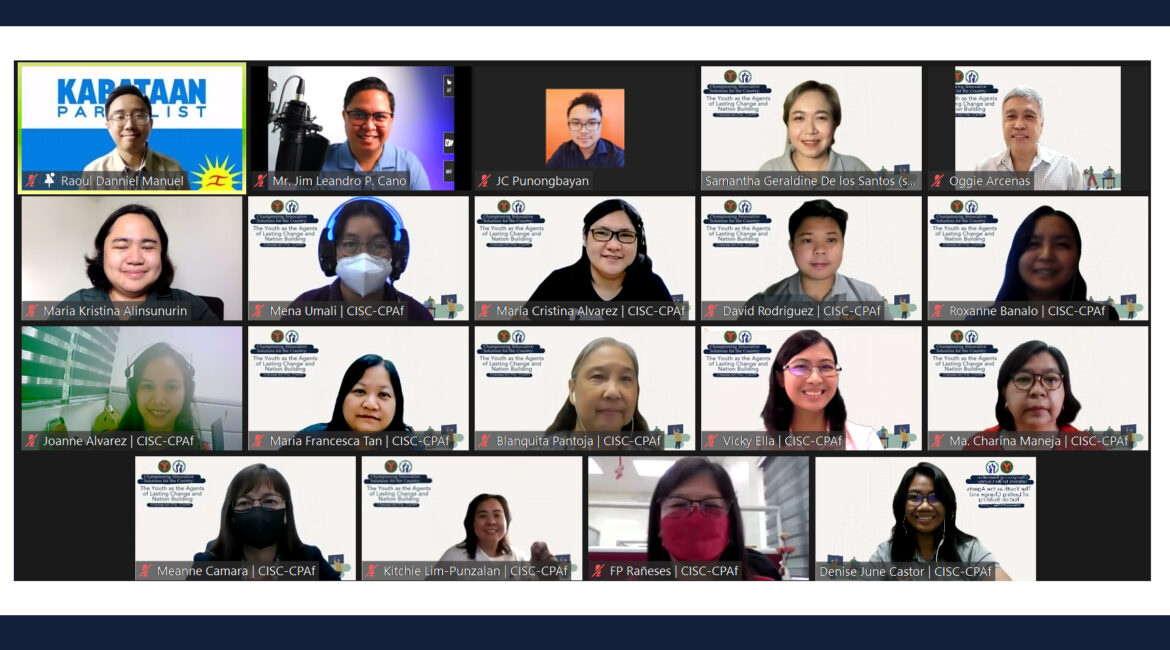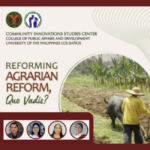“Youth is the hope of the nation.” This timeless line from Dr. Jose P. Rizal, the Philippines’ national hero, remains powerful and relevant to the present generation.
As part of the celebration of CPAf’s 25th Anniversary, CISC launched a webinar on Championing Innovative Solutions for the Country: The Youth as the Agents of Lasting Change and Nation Building last 13 December 2022.
Targeting the young bloods to be engaged in shaping our nation, the online event featured three young frontrunners for nation building in their respective fields of media, leadership, and agricultural entrepreneurship.
The Director of CISC, Dr. Agustin L. Arcenas, shared the importance of the youth sector in positively building our nation. “The topic of youth as agents of change and builders of our nation will never grow old”, he said. There have been successful campaigns of the youth that lead to positive impact in the past and this forum has been organized to epitomize the effective and strong role of the youth being the representative or voice of the masses. All of these are being called to uplift the state of our country.
In his recorded message, UPLB Chancellor Jose V. Camacho, Jr. also emphasized the role of youth as inheritors of the nation’s future and as catalysts of development and progress in the country. “This webinar will highlight and discuss the shape of the involvement of the youth and in what capacity, energy, enthusiasm and passion they can best contribute to nation building”, he stressed.
Congressman Raoul Danniel A. Manuel, one of the resource speakers and the first nominee of the Kabataan Party-list, highlighted the positive and progressive traits of the youth for the service of the Filipinos and uplifting of the country. According to Cong. Manuel, “it is good to learn with the elders since they have the experience, however, it must be complemented with fresh minds, and perspectives from the youth to better provide solutions in the interest of the majority.”
He also said that the young generation must learn with the masses, remold their thinking, and discard individualistic prejudices and predilections to pursue collective action.
Meanwhile, Mr. Jim Leandro P. Cano, Knowledge Management and Digital Solutions Head of Nature Tech Innovation Group, Inc., gave an insight on the roles and spaces for youth engagement and employment opportunities in the food systems. “Youth must be recognized in the spaces where decisions are made, be it formal or informal,” he said. According to Mr. Cano, continuously recognizing young people as agents of change and setting favorable policies and resources for them are critical for them to be involved and for their potential to be fully maximized. He ended his talk by saying that “youth are not only the futures, they are nation-builders today.”
On the other hand, Dr. Jan Carlo B. Punongbayan, Associate Professor from the UP School of Economics in UP Diliman, presented the economics of “infodemic”. He stressed that it will be very difficult for the youth to be engaged in nation building if the “tsunami of disinformation” will not be stopped. To address this, Dr. Punongbayan highlighted the importance of being vigilant, and promoting verification, fact checking, and online literacy. “It will be challenging to participate in our society when the information ecosystem we live in is like this,” he added. To address this, Dr. Punongbayan highlighted the importance of being vigilant, and promoting verification, fact checking, and online literacy.
Dr. Maria Kristina G. Alinsunurin, Assistant Professor of CPAf, served as the discussant of the webinar. She recognized the role of collective action to reinforce the influence of the youth. “The youth, which is conventionally defined through age, is no longer a limitation to influence policy and to initiate agenda and debates. Like any potential energy, the youth’s agencies are unlocked and continue to be unlocked,” she added.
In her talk, she challenged the youth sector to usher social change and contribute to the best of their capacities.
Serving as webinar moderator was Assistant Professor Samantha Geraldine G. Delos Santos, head of CPAf-KMO.










